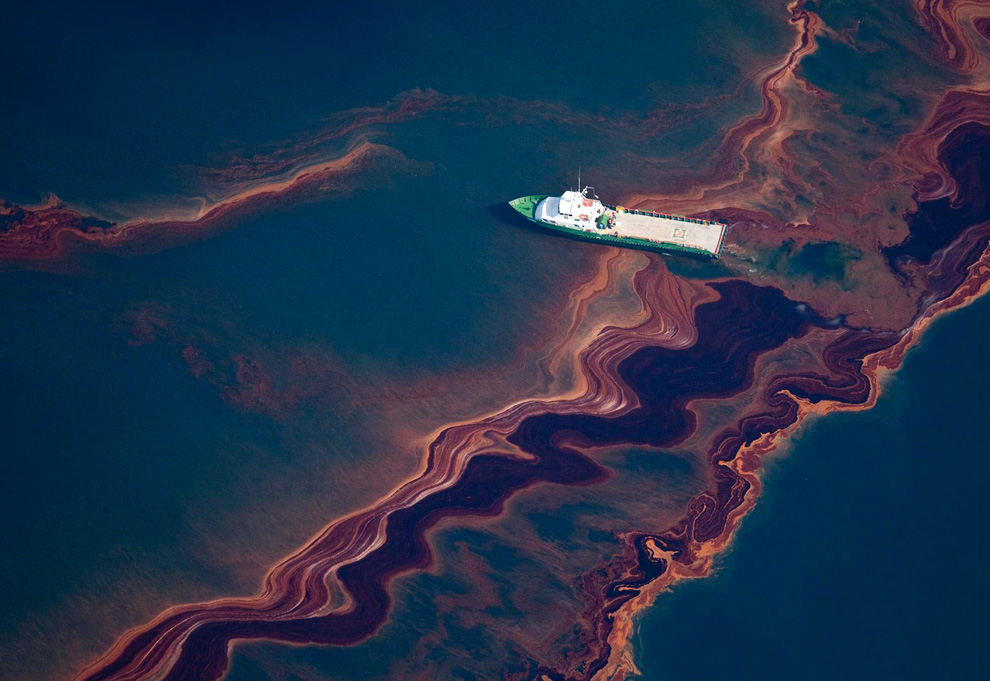 Two oceanographers are accusing BP of attacking academic freedom after a subpoena from the company forced them to hand over more than 3,000 confidential emails relating to the Deepwater Horizon disaster. After BP and the Coast Guards asked Woods Hole Oceanographic Institution for help in order to assess the magnitude of the damage caused by the catastrophic spill, the scientists produced more than 50,000 pages of documents, raw data, reports, and algorithms to assist BP in analyzing and confirming their findings. But then BP insisted on accessing their private correspondence on the matter as well.
Two oceanographers are accusing BP of attacking academic freedom after a subpoena from the company forced them to hand over more than 3,000 confidential emails relating to the Deepwater Horizon disaster. After BP and the Coast Guards asked Woods Hole Oceanographic Institution for help in order to assess the magnitude of the damage caused by the catastrophic spill, the scientists produced more than 50,000 pages of documents, raw data, reports, and algorithms to assist BP in analyzing and confirming their findings. But then BP insisted on accessing their private correspondence on the matter as well.
The scientists say that they are concerned not only about the invasion of privacy, but also about the impact on the "scientific deliberative process". Writing in the Boston Globe, they say:
“In these candid discussions among researchers, constructive criticism and devil’s advocacy are welcomed. Such interchange does not cast doubt on the strengths of our conclusions; rather, it constitutes the typically unvarnished, yet rigorous, deliberative process by which scientists test and refine their conclusions to reduce uncertainty and increase accuracy. To ensure the research’s quality, scientific peers conduct an independent and comprehensive review of the work before it is published.”
You can see why scientists would be so anxious about this in the wake of the University of East Anglia so-called “climategate” email leak. The climate-contrarian agenda filled countless columns using cherry-picked sentences culled from the leaked emails as evidence of the supposedly shaky basis of climate science. The fact that the scientists involved were ultimately cleared of any misconduct, and other scientists had repeated the apparently controversial scientific results, did little to assuage the damage that had been done through the sensationalist misrepresentation of ‘scientific deliberation’.
BP is potentially doing something very similar to the anti-climate science campaigners. Firstly, inhibiting future clear dialogue between scientists, and second, cherry-picking quotes to further their agenda. BP have been shown on a number of occasions to have withheld information or spun the true extent of the damage caused by the Gulf of Mexico disaster, and there it appears more than likely that they will continue to do so.
In May 2010, the US government sent a letter to then-CEO Tony Hayward saying that despite claims by BP that it was striving to keep the public and the government informed, "those efforts, to date, have fallen short in both their scope and effectiveness." More recently, despite disturbing reports of damage to marine eco-systems and ongoing health impacts of Gulf Coast communities, the glossy, BP-sponsored Gulf Coast tourism TV campaign has implied that everything is back to normal.
This potential misuse of these private emails to further BP’s cover up of the devastating spill is even more alarming in the longer term context of academic research in the area. BP’s Gulf of Mexico Research Initiative is administering $500 million over ten years in grants to support oil-spill research in the Gulf of Mexico. Although BP has agreed that research will be carried out independently of the company itself and that scientists will be able to publish without their consent, the funds will be overseen by a BP-hired contractor, and BP has appointed half of the people on a 20-member board that will select which research to finance. And, of course, forcing scientists to hand over private emails to BP sets a worry precedent in terms of academic freedom.
In 2003, Platform published a report called Degrees of Capture that showed how the oil industry had been extremely effective in annexing large chunks of the academic sector (and therefore, public subsidies) in order to meet the skills and knowledge-based demands of the industry and also to influence the nature of the energy debate. BP’s aggressive acquisition of private academic emails and its influence over research around the Gulf of Mexico disaster represent a disturbing new trend in which private companies are able to influence the parameters of critical scientific research into the dangers of extracting oil from increasingly fragile environments.